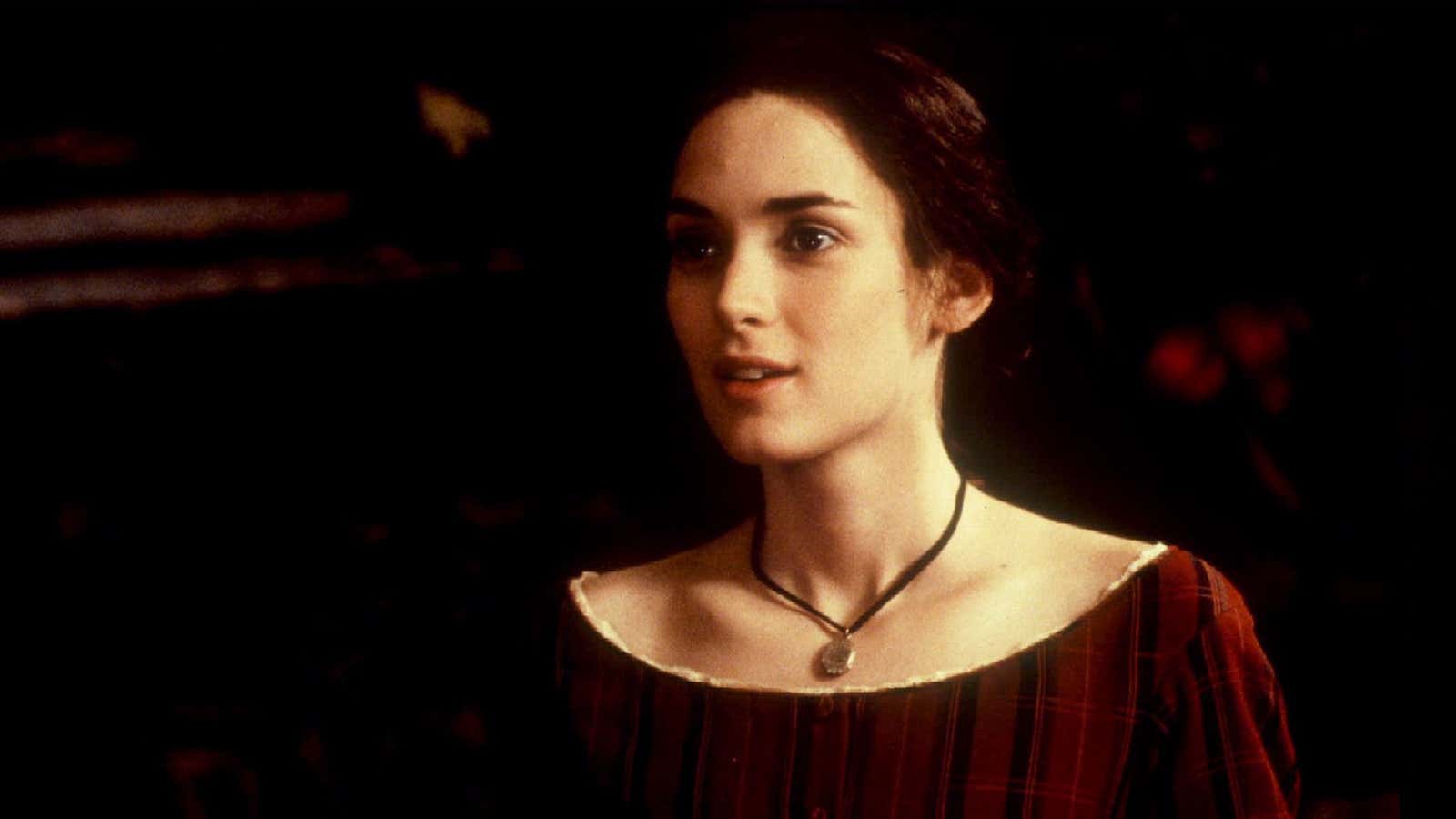This post contains spoilers for the book and 1994 film adaptation of Little Women.
Little Women, the novel completed by Louisa May Alcott in 1869, was an instant success. With its petty concerns and mild heartbreaks, its characters fretting over gloves and nose shapes, the book was acclaimed for the way it exalted the domestic lives of ordinary young American women.
The story of the March sisters has been adapted to the screen many times. This year, a PBS version started airing in the US in May. A contemporary retelling comes out in theaters in September. And Greta Gerwig, the Oscar-nominated director of Lady Bird, has just announced she’s directing a new adaptation, due for release at the end of next year.
Though the book was about four sisters, adaptations tend to focus on Jo, whom Alcott based on herself. She’s the natural focal point: restless, fitful, the 1860s version of a small-town teenager dreaming of transformation in New York City. Perhaps she’s the reason why the thoroughly modern Gerwig would be so drawn to the story 150 years on, despite its dearth of complexity and its constant moralizing.
But we’d be remiss to consider Jo’s appeal to modern women without crediting another face-of-a-generation It Girl who brought her to the screen: Winona Ryder’s performance in the role in the 1994 film version of Little Women, a classic of the classic. Today, it’s a bit cheesy and at times uncomfortably patronizing, and yet still so satisfying to watch.
Ryder is excellent: With her glittering black eyes and twitchy face, she’s at once open and vengeful, defiant and resigned, and completely believable as both awkward and blithely unaware of her beauty. She seems completely out of time, in contrast to her sisters: Meg, the only adult in the room, homely Beth, and frivolous Amy.
The things that make her relatable for a contemporary audience—her distaste for romance, shows of social standing, or for propriety in general—come together in one memorable scene: The March girls’ father, who’s been away fighting in the Civil War, is wounded, and Susan Sarandon, who plays Marmee, the wise owl of a mother, needs train fare to go see him. Jo is sent to ask her great-aunt for money and returns clutching $25. She admits she couldn’t bring herself to ask for the funds, and pulls off her hat to reveal her hair cut short to the neck. She’s sold her hair for her mother’s train ticket.
“Jo, how could you? Your one beauty!” cries young Amy (played by a 12-year-old Kirsten Dunst). In one of many group-hugs, everyone embraces Jo, who keeps up a brave face.
Later, in a scene that has broken millions of hearts around the world, Jo’s wealthy, lovably goofy neighbor Teddy Laurence (Christian Bale), proposes, confessing, “I have loved you since the moment I clamped eyes on you.” Jo’s eyebrows knit together, and she tells him, “I just can’t go be a wife.”
The fact that these two attractive best friends don’t end up together is a crushingly unjust twist of fate for young watchers. But the scene is also a litmus test for maturity; it’s clear to adult viewers that Jo needs an intellectual equal and must refuse to settle, even if the rest of the world expects her to be with the noble-browed neighbor who proclaims his love for her.
The greatest character change in the film happens to Jo, as she moves away from writing cheap thrillers, under a man’s name, to writing a book about her sisters, using her own. Jo’s great realization is that old writing cliché, that she should “write what she knows”—or as her German professor-boyfriend, Friedrich Bhaer, played by Gabriel Byrne with an unconvincing German accent, says, “You should be writing from life, from the depths of your soul.”
There’s so much about the adaptation that might cause today’s viewer to cringe: Teddy slut-shaming Meg at a party when she’s tippling in a corset and low-cut dress; professor Bhaer’s patronizing criticism of Jo’s genre of fiction; the way in which the women consistently have to bailed out by the men (save for Jo’s haircut heroics, of course). And some things that didn’t work then—the transition from young to adult Amy, played by Samantha Mathis, and the lack of explanation for her relationship with Teddy—still don’t.
But one of the great joys of watching this movie is to see scene after scene filled with, well, little women. They wander across the screen, looking at food, studying, getting ready for parties, group-hugging in awkward configurations. The men are just props for the central women, vehicles for plot and character development. That makes it all work, despite the wholesome truisms about moral character that Marmee keeps rattling off; or the fact that all the sisters who don’t pass away end up married; or the fact that, with only two exceptions, all the good people are poor and all the rich people are jerks.
“It’s just so inspiring,” Ryder said in a behind-the-scenes feature at the time, “because it’s just about goodness and being a good person.”
In an early scene of the film, Jo, meeting Teddy for the first time at a party in Concord, Massachusetts, holds her hand out to shake his. Then she remembers that her sister said that was no longer fashionable, and quickly takes it back. Later, Jo, having outgrown Concord, moves to New York City. When she approaches the boarding house where she’ll be living, ready to embark on a new life, the proprietress greets her with an outstretched hand. It’s a silly, quick moment, meant to show that time has passed. But it’s as if to say: Life really can be this simple.
Indeed, we grow up, the times change, and we move on from childhood and its simple resolutions. But just as Jo discovered, even for the most cynical among us, there are parts of childhood that never lose their shine.
